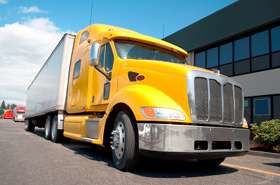Old School, Turtle, And All Youz Flatbedders Out There....
Topic 22840 | Page 2

I was told the lumber tarps are 170 lbs and the steel tarps are 140 but the canvas tarps feel more like 40 lbs. I did see a girl the was probably 95 pounds soaking wet put a lumber tarp on the bed of a truck. Keep in mind you still have to throw straps and use chains and bungee the tarps down as well. Stretching out 150 -200 bungees is a workout in itself. It’s not just the tarps though proper setup and secure meant are time consuming. I know where there is a will there is a way. I’m a large man of 6’ 1” 230 lbs and just switched from flatbed to temp control because the work was so intense I didn’t have enough time to drive and make the money I wanted. Good luck either way be safe.

The tarps we use are definitely heavy. Not terrible dry but wet they suck and if it’s cold and they’re frozen it sucks even more. But flatbeding keeps my ass from getting too fat, so I think it’s worth it. As well as the strapping and/or chaining.
New Reply:
New! Check out our help videos for a better understanding of our forum features

















Preview:








 TT On Facebook
TT On Facebook
Hello Donna!
I've got to tell ya that I love your attitude. You seem like the type of person who could do real well at trucking. I am a little concerned about you feeling cornered into a flat-bedding job though. I have no doubt that you can do it, that is not my concern. My problem lies in the fact that most successful flat-bedders are pretty passionate about their job. They enjoy working in the elements, they enjoy working with their hands, they enjoy a good challenge, and they don't mind getting right in there and making something happen. They generally choose this job, and it sounds like you are just going to take it because that is all that Roehl is offering in your area. That is a red flag to me.
Flat-bedding is tough, especially for a brand new rookie driver who has got so many other aspects of trucking to learn at the same time. It can be done - I did it that way, and so did Turtle and Juice Box, and many others. You just need to realize that you are adding a completely new dimension on to your rookie experience. The whole rookie experience is pretty tough as it is without adding the responsibilities for whether your load is going to stay on the trailer and if it is going to be protected from the weather properly.
Personally I would rather see you do a dry van driving job just to get your feet wet and get yourself established in learning to manage your time, your rig, and all the issues that come with this new career. There is just a lot to grasp during that first year, and to be honest with you it overwhelms many of the folks who try it. It would make more sense to move over into flat-bed after you've established yourself instead of adding so many more things to get accustomed to at the beginning.
Hey, I thought about these old threads where I took my daughters with me on the road. You should take a look at them, read them, take a good look at some of the pictures of the work I do, and get a feel for what a flat-bedder does out here on the road. Hopefully it will inspire you and not scare you, but if it sounds alarming then you might want to look in a different direction. I hope you enjoy reading these things as much as I enjoyed putting them together. Each of these girls are now married. It's been a few years since we did these trips, but they are timeless in the sense that they show what a flat-bedder does out here on the road.
My Trip With My Oldest Daughter
A Trip With My Second Daughter
An Adventurous Trip With My Youngest Daughter
Dry Van:
A trailer or truck that that requires no special attention, such as refrigeration, that hauls regular palletted, boxed, or floor-loaded freight. The most common type of trailer in trucking.OOS:
When a violation by either a driver or company is confirmed, an out-of-service order removes either the driver or the vehicle from the roadway until the violation is corrected.